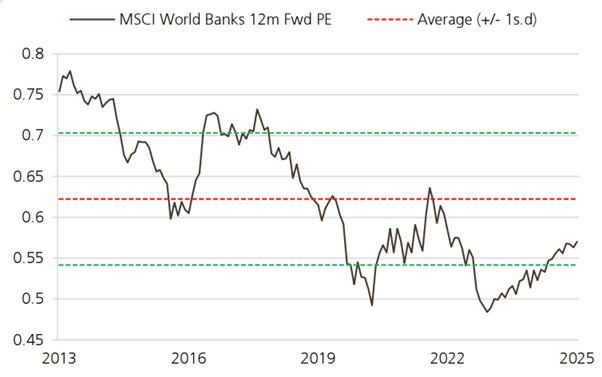

Having narrowly lagged wider equity markets during the strong rally in technology stocks in June/July, the global Financials sector resumed its outperformance in August and, at 26 September, was 4% ahead of the MSCI All Country World Index for the year to date, in sterling terms. In absolute terms, the Financials sector has returned an impressive 14% since the start of the year.
Its most recent run was led by a strong performance from US and European banks, both of which reported excellent Q2 earnings and a favourable outlook. In particular, capital markets activity is picking up and we have started to see an increase in both M&A (mergers and acquisitions) and IPO (initial public offering) activity. We continue to be overweight European banks where we think valuations still do not reflect the attractive returns on offer.
In recent weeks, the European August holiday period was interrupted by political developments in France and concerns that the fiscal position in the UK will lead to increased taxes. This has led to some short-term volatility in share prices which we hope will prove to be a buying opportunity. While there remains uncertainty in both cases, we are reassured by the fact that European banks and insurers are far better risk-managed and capitalised than they have been for over a decade. We will continue to look for opportunities to deploy capital when share prices over-react to what is likely to be a modest impact on the operating outlook for our holdings.
One area within Financials that has seen a more meaningful change is the global (re)insurance sector, where a period of very strong profitability is starting to increase competition. Over time, this will put pressure on (re)insurance prices and future returns. We recently met with several US insurers at a conference in New York City and management teams rightly point to the high level of absolute returns they are able to generate. However, markets are particularly focused on the direction of travel for returns and, despite strong Q2 earnings, the share price reactions have been more cautious. We have been repositioning our portfolio away from companies with exposure to areas where pricing pressure is most intense.
The debate on the impact of Artificial Intelligence (AI) for financials has recently been most intense for LSEG (London Stock Exchange Group), in which we have a modest position. The market has become concerned that large language models (LLMs) that can access easily access huge amounts of data could commoditise LSEG’s data and analytics business. The market has taken a ‘shoot first’ approach to this issue for LSEG as well as its peers, and we think there is an interesting case to be made that LLM partnerships could actually increase the demand for LSEG’s proprietary data sets over time.
Strong fundamentals; attractive valuations
Despite the strong performance of banks and the wider Financials sector, we think it is important to remember that share prices across the sector remain reasonable compared with wider markets. We believe Financials offer a compelling way for investors to access a sector with strong fundamentals at attractive valuations and to diversify their existing holdings in higher-growth areas. Higher interest rates could also help the sector sustain significantly better returns than in the decade following the global financial crisis, which we believe is not reflected in current valuations.
| Global banks price-to-earnings1 relative to the market |
 |
| Source: UBS, Refinitiv Datastream. 1.Price-to-earnings relates a company's share price to its earnings per share. |
Financials’ strength
The global Financials sector provides access to large, diversified businesses, overseeing $400trn in assets – the second largest sector in global equities – with many compelling idiosyncratic stock opportunities. At the same time, they offer exposure to attractive structural thematics, including the growing demand to finance and insure the green transition.
All in, Financials is one of the world’s largest and most diverse sectors yet remains attractively priced compared with wider markets. With strong balance sheets, resilient earnings and exposure to long-term themes, we believe they offer an excellent way for investors to diversify and position portfolios for future growth.



